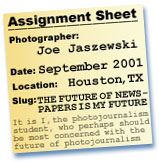 |
|
|
 |
 |
|
|
 |
THE FUTURE OF NEWSPAPERS
IS MY FUTURE
by Joe Jaszewski
Photo Intern
Houston (TX) Chronicle
It is I, the photojournalism student, who perhaps should be most concerned with the future of photojournalism and newspaper photography. When I graduate next June, it could be the worst photojournalism job-market in nearly ten years. I have friends who graduated a year or two ago who still haven't found full-time jobs. Some are trying to freelance to make a living and are finding that difficult to do.
During a round-table discussion between the publisher of the Houston Chronicle and the summer's interns (I am the photography intern), the issue of newspapers surviving the digital age was brought up. The publisher made a good point: newspapers have survived threats to their existence from radio and television and have survived them both. The internet won't kill newspapers.
Predictions five years ago that many in this country would have broadband internet access in three years simply have not come true. Broadband is definitely more available today than it was then, but even so streaming video on the internet isn't a reality for many Americans. They still get their video on TV. They listen to the radio in the car. And many still get the newspaper every day. There is no doubt newspapers will have to adapt to new marketplaces, just as any business would. But I don't see the demise of the daily newspaper in the near future. Newspapers are so ingrained in American culture that for them to disappear would require a drastic societal shift, one that would take decades.
So much information is available so quickly with electronic communication. I get baseball scores, news updates and weather forecasts all on my pager. A quick sign-on to the internet will give me my stock prices and news from the wire. What the internet hasn't consistently offered as of yet is in-depth reporting on regional news. Besides the website of my local newspaper, there is no other source for news specific to my region that isn't on the wires. Perhaps newspapers in the future will embrace this information void and cease trying to compete with other mediums in the speed category and instead provide the depth and quality of reporting that speed leaves behind. I cringe when I see newspapers spend money to send photographers to out-of-town events only to duplicate wire-service coverage. Just think if those resources were redirected to in-depth reporting on relevant issues that no one else is covering. That is where the newspaper can really make itself valuable.
Another issue facing newspapers is the lack of young people who read the newspaper and the advertisers' desire to court the young-adult market. There are so many options for the tech-saavy, as young people are often classified, when it comes to consuming information. And studies have shown that few take the newspaper. My news-junkie roommates and I are the exception to the rule as we subscribe to three daily newspapers. Most don't. Yet young people have never traditionally been big newspaper readers. Did the youth of the 1930's, 1950's, or 1970's read the newspaper much more often? I have no data to back me up on this, but I speculate not. It is our nature to live a more fast-past, self-centered lifestyle that often means foregoing the luxury of being able to leisurely browse the newspaper everyday. I hypothesize that my generation will read newspapers like the others have; just give us a few years.
When I decided to attend the University of California, Davis, I did so knowing they didn't have a photography or journalism major. I wanted an education which was broader and left more options open for me after graduation. My major of American Studies lets me do just about anything I want. Right now, I want to be a photojournalist. After graduation I will have to survey the opportunities available to me at the time and decide what I want to do.
Will I be a newspaper photographer my whole life? Who the heck knows. Will I be in the news business my whole life? I like to think so. Will I always do something I love? You betcha.
Joe Jaszewski
| Contents
Page |
| Contents Page | Editorials | The Platypus | Links | Copyright |
| Portfolios | Camera Corner | War Stories | Dirck's Gallery | Comments |
| Issue Archives | Columns | Forums | Mailing List | E-mail Us |